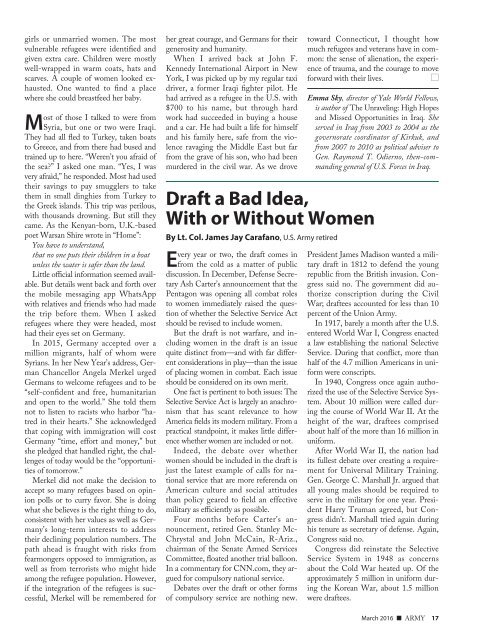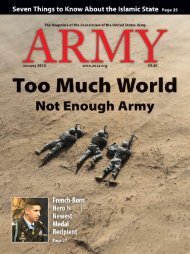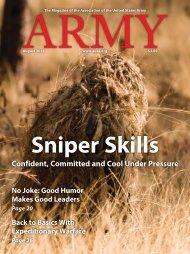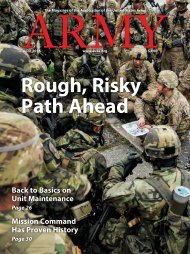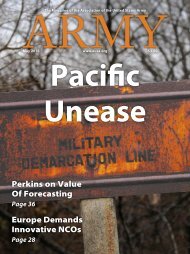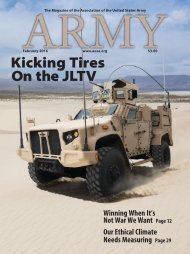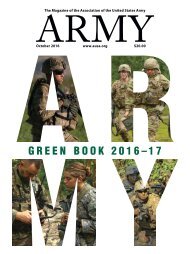Army - Stimulating Simulation
You also want an ePaper? Increase the reach of your titles
YUMPU automatically turns print PDFs into web optimized ePapers that Google loves.
girls or unmarried women. The most<br />
vulnerable refugees were identified and<br />
given extra care. Children were mostly<br />
well-wrapped in warm coats, hats and<br />
scarves. A couple of women looked exhausted.<br />
One wanted to find a place<br />
where she could breastfeed her baby.<br />
Most of those I talked to were from<br />
Syria, but one or two were Iraqi.<br />
They had all fled to Turkey, taken boats<br />
to Greece, and from there had bused and<br />
trained up to here. “Weren’t you afraid of<br />
the sea?” I asked one man. “Yes, I was<br />
very afraid,” he responded. Most had used<br />
their savings to pay smugglers to take<br />
them in small dinghies from Turkey to<br />
the Greek islands. This trip was perilous,<br />
with thousands drowning. But still they<br />
came. As the Kenyan-born, U.K.-based<br />
poet Warsan Shire wrote in “Home”:<br />
You have to understand,<br />
that no one puts their children in a boat<br />
unless the water is safer than the land.<br />
Little official information seemed available.<br />
But details went back and forth over<br />
the mobile messaging app WhatsApp<br />
with relatives and friends who had made<br />
the trip before them. When I asked<br />
refugees where they were headed, most<br />
had their eyes set on Germany.<br />
In 2015, Germany accepted over a<br />
million migrants, half of whom were<br />
Syrians. In her New Year’s address, German<br />
Chancellor Angela Merkel urged<br />
Germans to welcome refugees and to be<br />
“self-confident and free, humanitarian<br />
and open to the world.” She told them<br />
not to listen to racists who harbor “hatred<br />
in their hearts.” She acknowledged<br />
that coping with immigration will cost<br />
Germany “time, effort and money,” but<br />
she pledged that handled right, the challenges<br />
of today would be the “opportunities<br />
of tomorrow.”<br />
Merkel did not make the decision to<br />
accept so many refugees based on opinion<br />
polls or to curry favor. She is doing<br />
what she believes is the right thing to do,<br />
consistent with her values as well as Germany’s<br />
long-term interests to address<br />
their declining population numbers. The<br />
path ahead is fraught with risks from<br />
fearmongers opposed to immigration, as<br />
well as from terrorists who might hide<br />
among the refugee population. However,<br />
if the integration of the refugees is successful,<br />
Merkel will be remembered for<br />
her great courage, and Germans for their<br />
generosity and humanity.<br />
When I arrived back at John F.<br />
Kennedy International Airport in New<br />
York, I was picked up by my regular taxi<br />
driver, a former Iraqi fighter pilot. He<br />
had arrived as a refugee in the U.S. with<br />
$700 to his name, but through hard<br />
work had succeeded in buying a house<br />
and a car. He had built a life for himself<br />
and his family here, safe from the violence<br />
ravaging the Middle East but far<br />
from the grave of his son, who had been<br />
murdered in the civil war. As we drove<br />
E<br />
very<br />
toward Connecticut, I thought how<br />
much refugees and veterans have in common:<br />
the sense of alienation, the experience<br />
of trauma, and the courage to move<br />
forward with their lives. ■<br />
Emma Sky, director of Yale World Fellows,<br />
is author of The Unraveling: High Hopes<br />
and Missed Opportunities in Iraq. She<br />
served in Iraq from 2003 to 2004 as the<br />
governorate coordinator of Kirkuk, and<br />
from 2007 to 2010 as political adviser to<br />
Gen. Raymond T. Odierno, then-commanding<br />
general of U.S. Forces in Iraq.<br />
Draft a Bad Idea,<br />
With or Without Women<br />
By Lt. Col. James Jay Carafano, U.S. <strong>Army</strong> retired<br />
year or two, the draft comes in<br />
from the cold as a matter of public<br />
discussion. In December, Defense Secretary<br />
Ash Carter’s announcement that the<br />
Pentagon was opening all combat roles<br />
to women immediately raised the question<br />
of whether the Selective Service Act<br />
should be revised to include women.<br />
But the draft is not warfare, and including<br />
women in the draft is an issue<br />
quite distinct from—and with far different<br />
considerations in play—than the issue<br />
of placing women in combat. Each issue<br />
should be considered on its own merit.<br />
One fact is pertinent to both issues: The<br />
Selective Service Act is largely an anachronism<br />
that has scant relevance to how<br />
America fields its modern military. From a<br />
practical standpoint, it makes little difference<br />
whether women are included or not.<br />
Indeed, the debate over whether<br />
women should be included in the draft is<br />
just the latest example of calls for national<br />
service that are more referenda on<br />
American culture and social attitudes<br />
than policy geared to field an effective<br />
military as efficiently as possible.<br />
Four months before Carter’s announcement,<br />
retired Gen. Stanley Mc-<br />
Chrystal and John McCain, R-Ariz.,<br />
chairman of the Senate Armed Services<br />
Committee, floated another trial balloon.<br />
In a commentary for CNN.com, they argued<br />
for compulsory national service.<br />
Debates over the draft or other forms<br />
of compulsory service are nothing new.<br />
President James Madison wanted a military<br />
draft in 1812 to defend the young<br />
republic from the British invasion. Congress<br />
said no. The government did authorize<br />
conscription during the Civil<br />
War; draftees accounted for less than 10<br />
percent of the Union <strong>Army</strong>.<br />
In 1917, barely a month after the U.S.<br />
entered World War I, Congress enacted<br />
a law establishing the national Selective<br />
Service. During that conflict, more than<br />
half of the 4.7 million Americans in uniform<br />
were conscripts.<br />
In 1940, Congress once again authorized<br />
the use of the Selective Service System.<br />
About 10 million were called during<br />
the course of World War II. At the<br />
height of the war, draftees comprised<br />
about half of the more than 16 million in<br />
uniform.<br />
After World War II, the nation had<br />
its fullest debate over creating a requirement<br />
for Universal Military Training.<br />
Gen. George C. Marshall Jr. argued that<br />
all young males should be required to<br />
serve in the military for one year. President<br />
Harry Truman agreed, but Congress<br />
didn’t. Marshall tried again during<br />
his tenure as secretary of defense. Again,<br />
Congress said no.<br />
Congress did reinstate the Selective<br />
Service System in 1948 as concerns<br />
about the Cold War heated up. Of the<br />
approximately 5 million in uniform during<br />
the Korean War, about 1.5 million<br />
were draftees.<br />
March 2016 ■ ARMY 17


